Dear Artist,
While at a dinner party recently, I mentioned that I often find socializing overwhelming and prefer to stay home and paint. After dropping this dessert bomb, I glanced around the table and noticed the other artist present nodding. A discussion ensued about where people draw energy, restorative activities, creativity and stimulation. The butterflies listened with empathy and acknowledgement, but I went home feeling a little vulnerable about my newly revealed secret.

The Mountaineers – Big Horn Sheep on Wilcox Pass, 1912
Oil on canvas
60 x 75 inches
by Carl Clemens Moritz Rungius (1869-1959)
The following day, I ran into a friend who was desperate to share some news. “Have you heard of the term, ‘Highly Sensitive Person?’” he asked. “Yes,” I replied. “My Dad diagnosed himself with HSP in 2005 and wrote a letter about it – it’s apparently especially common amongst creative people.” It turns out my friend had been at another dinner party where a woman he didn’t know very well, after chatting with him for a while, recognized something and shared with him an online sensitivity test. He took it there and then, and passed with flying colours. Often bothered by loud noises, attuned to the moods of others, an avoider of violent films, likely to withdraw when overwhelmed and easily startled, my friend suddenly felt as if he had just discovered a new and comforting planet to which he belongs.
Because sensitivity has generally been considered a vulnerability and not a strength, sensitive people have been seen as at greater risk for depression, or at least lacking in resiliency when facing obstacles, grief, maltreatment or other adverse life experiences. Perhaps this is why many HSPs work hard to avoid making mistakes, confrontations or other negative experiences. In this sense, some are perfectionists; while others are avoiders. Many are introverts.
Dr. Michael Pluess, professor of psychology at the Queen Mary University of London, has recently coined a term to describe his theory that sensitive people, while hit hard by discord, also experience deeper benefits from experiences that are positive – much more than their less sensitive counterparts. “Vantage Sensitivity,” says Dr. Pluess, is a strength amongst the sensitive. The other 85% or so of the population – the non-HSPs he says, experience what he calls, “Vantage Resistance” – they don’t get as much out of the windfall. (If no major positive influences are present, Dr. Pluess says that vantage sensitive and vantage resistant are likely to have similar levels of well-being.) If his theory holds water, HSPs can face both negative and positive experiences knowing that each will hold extra weight, meaning and impact. For an artist, it’s a compelling enough reason to continue with the pursuit and creation of beauty; and the sharing of your triumphant expression.
Sincerely,
Sara
PS: “By words one transmits thoughts to another; by means of art, one transmits feelings.” (Leo Tolstoy)
Esoterica: “This is a central dilemma for many artists: ‘How do I manifest my innate sensitivity in a not-so-sensitive world?’” wrote my Dad in his 2005 letter, Highly Sensitive Persons. “There are many ways. One of the handiest is the simple realization that many we interact with are not so sensitive. They may not know or admit it, but they couldn’t get along without our sensitivity. They need us. And we need them. A sensitive person needs to learn how to interact in this lop-sided world. Humour and playfulness are valuable. So is immersing oneself in the history of art and artists. The timeless brotherhood and sisterhood of art (which includes other HSPs) gives us a sense of community and a philosophic balance. The knowledge derived from like-minded companionship gives a feeling of “I’m okay — you’re okay.” More than that, one finds that the world needs more HSPs — these days, more than ever.”
You can take Psychologist and HSP expert Elaine Aron’s test, here.
Elaine Aron’s 1997 book, The Highly Sensitive Person: How to Thrive When the World Overwhelms You is here.
Have you considered a Premium Artist Listing? With each letter, an artist is featured at the bottom of this page. The Premium Artist Listings are a means of connecting artist subscribers through their work. Proceeds from each listing contribute to the production of The Painter’s Keys.
“Research studies provide evidence that highly sensitive children benefit especially strongly from positive experiences, such as psychological programmes aimed to improve psychological well-being. The Vantage Sensitivity model is helpful in describing such differences and advances our theoretical understanding of the benefits of high sensitivity.” (Dr. Michael Pluess)
Featured Artist
Los Angeles-based artist Lisa Chakrabarti works in a variety of media: oils, acrylics, pastels, watercolors, graphite and colored pencils. Focusing on a style she calls “romantic naturalism” – impressionism based largely on subjects in the natural world – her works have found their way into galleries in Los Angeles, Florida, Colorado and New York. In 1995, after being introduced to sumi-e and Chinese ink painting by Asian friends, Lisa became captivated by the apparent freedom and subtlety of this ancient medium. This shift in focus has informed her work ever since.



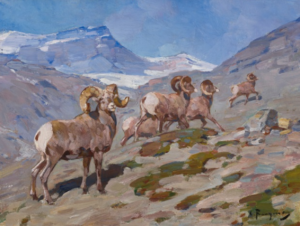
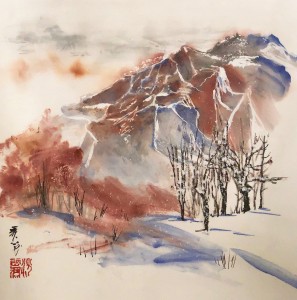
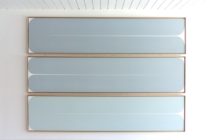
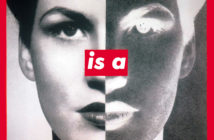
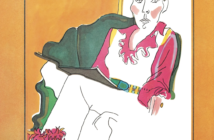
18 Comments
I wonder if this HSP, along with other labels like “empath” or hyper-vigilance are all connected through some thread unresolved trauma.
This rings so true for me- I’ve often felt a bit of an alien in certain social circles, where the discussion is on “adult” movies or tv shows… I tend to prefer watching PBS Kids’ shows. Currently, my dilema is whether I should spend part of my spring break visiting my sister in Costa Rica, or go up north to Grand Marais, MN and paint alone for five days… The thought of being on an airplane and in an airport, and in a sought after vacation destination where there will be lots of other people (and NOISE) really honestly freaks me out.
I am also very aware that I need quiet and down time in order to be good at my job as an art teacher for elementary and middle school students. It is difficult to get 10 year olds to settle down and be quiet inside after a run of 5 below-zero days when they can’t get outside to get their energy out…
Painting is my solace.
Grand Marais? In the snow? Sounds heavenly. I live in North Texas but love beautiful Minnesota!
I am an artist, HSP and I live in Costa Rica for 23 years. Perhaps you can visit a bit with your sister and head off to the many quiet places in CR to paint. There is so much to paint here! Painting for 5 days alone also sounds inviting.
GRAND Marais !!! oh so grand! My husband and I went on an RV trip that started out as 4 days but lasted 7 1/2 moths. We went where the roots took us, from CA up into MN to visit friends, then into Canada b4 aimlessly heading south all the way into Mexico. My most peaceful week on the trip was in Grand Marais. We stopped there one night and I didn’t want to leave, but by then fall was coming so we had to move on. My most favorite trip photos were taken there. Thank you for the reminder! It was a true salve for the HSP that I am.
I agree with Pat and Sara’s fine letter.I had the same diagnosis of HSP from an allergy specialist about twenty years ago. So many of the outside stimuli were affecting my health and once understood, I became much better. It explained so much and why I feel so overwhelmed in social situations. I love alone time and quietness, the lovely solitary walks in the woods and non-agressive programs. I am comfortable knowing that I understand myslef and live happily within my space. My art is my solace and joy.
I’ve know that I have been an “HSP” since I was a child. My mother “diagnosed” me and told me that I was cool and to just be myself. When we have several lenses in which to view the world, it becomes a very exciting and cherished place to be. Isn’t it interesting that earth is the only planet we know of which houses humans? Maybe loving that and accepting all of the humans is the best way to get along.
Sensitivity is a strength – understood by the artist a vehicle for profound and meaningful work. Keep up with expressing your amazing gifts.
Thank you, Sara. I love having this new perspective to ponder!
Thank you Sara, so comforting and well worded!!
Thank you Sara for the enhanced reminder (after your dad’s previous explanation) that makes me feel really OK with myself the way I am in spite of lack of understanding by others. I am no longer going to worry about not living up to their expectations and social obligations.
Hmmmm, went back and read your dad’s letter and took the test, although I don’t need to take a test to know I am an HSP, I did it and passed with flying colours. Even if I wasn’t an artist I’d know I wear this label well. My mother was one, too, my grandmother as well. I used to find it odd how my mom and grandmother refused to leave the house. On special occasions when they had to, they practically needed hypnosis or heavy medication for their anxiety over having to go out. Safe ordinary regular things were okay for Mom, like us going shopping, but anything else? forget it. Yes, in my younger days I thought this was a sad disability that they had. Now, I totally get it, let me stay home and I am happy. It’s not a disability, it’s just the way we are wired, and for most of it, it is an advantage. We didn’t cave in over a pandemic hitting, we thrived in not having to make excuses to get out of things. I am a super caregiver to my husband who has Parkinson’s because I don’t feel deprived at my loss of freedom to do things on my own. We find ways to enjoy life for whatever it presents each day. I think of my grandmother sitting in a chair looking out a window in her laundry room. Lost in a daydream gazing out the window, quite content. It’s a memory that makes me smile, too, I so get it.
So well said! My first time identifying myself this way and so validating…..and freeing. I’m OK!! Wow!!
Dear Mary,
I’m so sorry your husband has Parkinson’s.
So many of us in the sisterhood and brotherhood of artists are sensitive and have been rehearsing for this pandemic.
Grateful for not requiring an excuse to stay in my studio and paint.
Take good care of yourself too.
Nancy Oppenheimer
Hi, Sara. I saved a copy of your dad’s letter when it first appeared, also shared it with my sister at that time. Too often HSPs are seen as able to just try harder to fit in with others. Too much contortion!!!!! HSP sensitivity is a trait that allows us to bring more truth to our art. That focus is necessary to our production. We often just don’t have the juice to focus in other directions without shortchanging our art. Contrary to what non-HSPs insist, we can’t change our essence without destroying our gifts.
Thank you so much, Sara, for this post. It was your father’s letter all those years ago that introduced me to the idea of some people being HSPs, especially artists, poets, and other creatives. I took Dr. Elaine Aron’s test and I passed nearly every criterion. I read her book and it was a revelation to me, as I also always felt to be an outsider and didn’t really relate to or enjoy the activities others found desirable – like football games, festivals, loud noises, parties, cocktail chat, on and on. That was my introduction to better understanding myself and being okay with it. All thanks to your Dad! So good to open your letter today and read of your bravery in telling others about “overwhelm” from such social occasions. I’m with you, Sara. It was validation all over again. Thanks. -Jan
Thank you so much Sara
Very uplifting… despite living “clean” -active, healthy in mind n spirit, and optimistic I’m blessed to be in the studio/garden most days- this letter rings so true. I can be a people person for a few hours, then “I’m done.”
Best wishes to all. Julie http://www.society6.com/julienorthey and Paintings by Julie Northey on Facebook (arg I have neglected my old website!)
I went back and read your dad’s letter and took the test. I don’t need to take a test to know I’m an HSP, but I did it and did quite well.